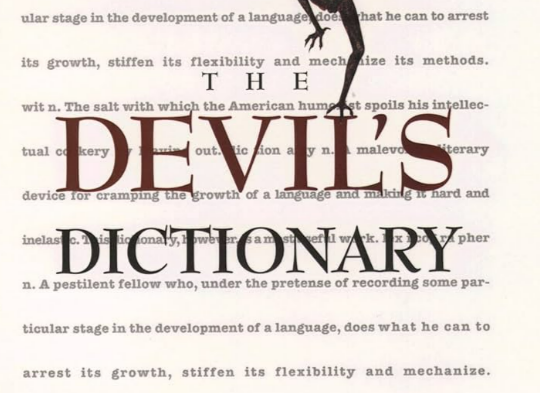The Devil’s Dictionary
Chapter 9
byChatGPT said:
Chapter 9 begins with a smirk hidden behind the word Kiss, which Bierce calls a poetic rebranding of bliss—a subtle jab at how romance is often packaged more sweetly than it deserves. The act, often idealized in verse and song, is reimagined as something more reflexive than romantic, a gesture built on impulse rather than deep emotion. This reframing suggests that intimacy is less about connection and more about repetition of socially expected rituals. Bierce doesn’t dismiss affection outright, but he implies that many expressions of it are more habitual than heartfelt. In doing so, he strips away the sentimentality and leaves behind the mechanical structure of human interaction, hidden beneath layers of metaphor and performance.
Law, usually revered as the backbone of order, is instead reduced to a method of transferring rights and property from one person to another, typically through manipulation rather than justice. For Bierce, the legal system doesn’t serve the people—it serves those skilled enough to navigate or exploit it. The Lawyer, then, becomes not a guardian of fairness, but an expert in bending rules without breaking them, reinforcing the idea that morality is often optional when hidden behind legal language. Bierce’s critique doesn’t come from disdain for law itself but from disappointment in how it’s applied. His satire reminds readers that laws can be tools of power just as much as protection, and those interpreting them aren’t always guided by ethics.
With Laughter, Bierce toys with the idea that it is humanity’s distinguishing reflex—a nervous, contagious symptom of recognizing absurdity. Animals, he notes, are immune to it, perhaps because they don’t suffer from the complexities that provoke human giggles: embarrassment, irony, or social discomfort. Laughter becomes both a release and a signal, not of joy, but of inner conflict made visible. Bierce’s interpretation shifts laughter from being lighthearted to a behavioral quirk, one that uncovers the strange intersection of fear, confusion, and denial. It’s a sound, he suggests, that reveals how little sense we often make of our world—while pretending otherwise.
The definition of Liberty is delivered through a tale rather than a statement. A monarch, told that liberty is dearer than life, agrees—and immediately executes his critic, remarking that they may now enjoy both. This dark anecdote captures the tension between authority and freedom, poking at how easily the latter is dismissed when it threatens power. Bierce reveals how liberty is often praised in theory but strangled in practice. The contradiction between what nations preach and what rulers allow is his focus, exposing the hollowness of declarations that go unexamined. He suggests that liberty, while universally lauded, is rarely delivered without condition or cost.
As the chapter continues, Life becomes a theater of contradiction. A man, reflecting on life’s supposed worthlessness, grows increasingly attached to it when death comes too near. Bierce uses this fictional scenario to reveal how people philosophize from safety but cling to survival instinctively. Life, once abstract, becomes urgent when it’s threatened. This definition hits at human hypocrisy—how values change depending on circumstance. Bierce does not belittle life itself, but rather our inconsistent ways of judging it. For him, life is not sacred because of its duration or meaning, but because it is ours, and we fear its end more than we admit.
Other entries like Loss, though briefly touched, extend the thread of human contradiction. Bierce suggests that loss is mourned not for what is gone, but for the interruption of what was assumed to be permanent. He views human emotion not as deep insight, but as reactive habit—built on surprise that anything might ever change. From Laughter to Loss, each word reflects how expectations define reactions more than understanding does. It is not what happens to us that matters most, Bierce implies, but how little we’re prepared for it despite our lofty philosophies and civil institutions.
In every line of this chapter, Bierce balances humor with bleak honesty. His definitions expose not only societal flaws but also individual delusions—how we interpret reality based on convenience, not truth. Through legal critiques, existential musings, and ironic anecdotes, he challenges readers to look past the polished meanings we assign to words. Each reimagined definition pushes us toward uncomfortable clarity. We’re asked not to reject language or law, but to recognize their limitations and the intentions behind how they’re used. The Devil’s Dictionary doesn’t just redefine—it reframes the world in ways that remain sharply relevant, daring readers to laugh at the lies they’ve long mistaken for truths.


0 Comments